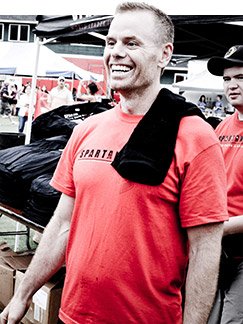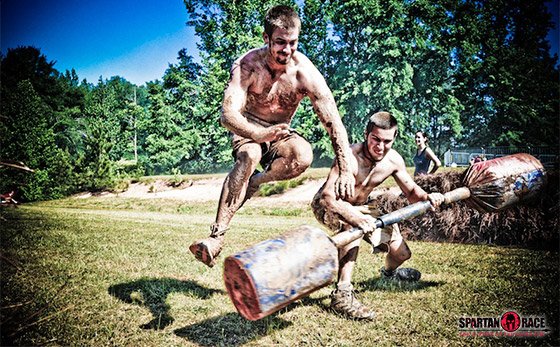
My name is Joe DeSena. I was raised in Queens in a rough neighborhood and a broken home, but I've never been interested in using either as an excuse. I've been an entrepreneur since age 8, and a successful one for nearly as long. I started a pool-cleaning business when I was a teenager, and I made it a million-dollar enterprise because I was willing to work 'round the clock and many of my clients were members of New York's crime syndicate families.
After graduating college, I made several million dollars on Wall Street, but like many others before me, I discovered it wasn't fulfilling. So I started running. First it was a 5K, then a marathon. Soon enough, I was doing three ultra-marathons in one week and the Iditarod on foot, trudging forward even after my eyelids froze shut. Even that wasn't enough.
I left Wall Street and bought a 140-acre farm in rural Vermont to ponder my next challenge. It was here where I founded Spartan Race, which has gone in the span of 10 years from a crazy obstacle race in a field at our farm to a multimillion-dollar global phenomenon.
Every weekend thousands of people flock to our events, which are staged year-round across the world. They are looking to better themselves, hoping to "Spartan Up!" and embrace all that such a phrase has quickly come to embody. I'm their biggest supporter and their worst nightmare, usually at the same time.
People may think I'm crazy, sadistic, relentless, and maniacal, and that I just like to fuck with them, but they trust that there's a method to my madness. Why else would everyone from Olympic athletes to Fortune 500 executives to Special Forces soldiers trek up to Spartan HQ for individual and team coaching on how to prepare for the unexpected?
When elite groups arrive at our tiny local airport for a weekend of intensive training, they might be picked up or they might be ignored—no cabs, shuttles, or vans wait at the curbside. Nothing. A 10-mile trek to our compound inevitably leaves them tired, pissed, and frustrated, but their immersion in chaos will have only just begun. That may sound cruel, but they quickly learn that it's no different than the negative feelings we all have to confront in our daily lives.

I don't care if you're a bodybuilder or other fitness competitor, or an overweight gym-phobe looking to spark the fire of transformation—the principles of Spartan Race can help you. Even if you have no intention of doing a race, embracing these rules will help you crush it in the gym, take your sport to a higher level, or be a better parent or worker. They can be whatever you want or need.
Step 1: Overcome your short-term desire for comfort
Spartan races aren't long in the traditional sense. Most are just 3 miles, and even a top-level "Beast" race is usually somewhere around 12 miles. But in terms of the strength and resolve they demand—and build—they're inspired by my experiences with cruel and unusual endurance races like the Iditarod and the Badwater 135.

Anyone who has done an ultra-endurance event has reached a point where they had to distance themselves from their body and keep pushing forward, impervious to every human impulse telling them to stop. In this situation, your rational mind stops functioning, you lose the ability to reason, and you start functioning in a primal way.
It may sound terrifying, but the upshot is that true transformation only happens outside of your comfort zone. Extreme training is all about saying no to comfort, and yes to self-imposed suffering. It's similar to the way religions around the world demand their followers practice fasting and give up worldly luxuries in order to strengthen their mind, body, and soul. Similarly, after long ordeals with cancer and other illnesses, survivors often speak of being reborn. After enduring so much pain, everything around them becomes more fresh and vibrant.
Try this: If the previous three paragraphs sounded scary or foreign, you need to inject a little hardcore into your life. It doesn't have to be an obstacle race; it could be one of the hardcore trainers on Bodybuilding.com. Sure, the workouts of guys like Jim Stoppani, PhD, and Greg Plitt may make you intensely uncomfortable in the moment. But when you break through to the other side of hell and finish a workout that almost made you quit over and over, you feel accomplished, incredibly proud of yourself and, in some ways, a different person.
Step 2: Show your body what real stress feels like
Have you noticed how many people stress out over the smallest things? They take something that should be a tiny annoyance and make it into a full-on sweaty, pulse-pounding battle. Here's the problem: Our body's fight-or-flight mechanism is supposed to kick in when we are running from a lion to save our lives, not when our coffee is too cold, we get poor restaurant service, or the kids are screaming in the backseat.
To change this tendency takes time and concerted effort. The easiest way to convince your body that sitting in traffic is not worthy of a stress-induced freakout is by training yourself in a controlled setting—your daily workout.

When you train hard, whatever situations may come up during the rest of your day won't be stressful in comparison. If I was able to push through that last set of burpees when my muscles were all shaking, or that last quarter-mile when my lungs were on fire, I find I can easily handle whatever obstacles come up during my day.
Try this: Every morning, make sure to get in your 60 or however many minutes of pain you can manage. Working out first thing releases all types of post-training pleasure chemicals, and the rest of the day feels easy in comparison.
Step 3: Set a deadline
Deadlines are for time what budgets are for money: a way to force yourself to allocate your resources efficiently and get your shit together. Sure, you could spend two years trying to lose weight and get in shape, but you sacrifice a lot by not moving more quickly. The more time you're out of shape, the more health damage can accrue, and the more comfortable you get in a state of mental and physical disrepair.

Your deadline shouldn't be random, like, "I need to be in top shape in two months." Peg it to a specific event, like a race, the end of a transformation contest, or even just a special event such as a wedding or vacation. That way, if you miss the deadline, the consequences are real and measurable, not abstract. This makes you accountable.
Try this: While things like weddings and vacations work for many people, I happen to believe that there's no substitute for the unpredictable challenges that a race provides. Consider signing up for a Spartan Sprint near you. Once you do, there's no turning back; you are committed to it.
Step 4: Turn your inner pain into an outboard motor
Am I intense? Yes, and I'll be the first to admit it. I have an enormous passion for life, as does the whole Spartan team. I completed more than 10,000 burpees a few weeks ago because our new marketing team roped me into it. When I'm surrounded by people with that kind of passion, I feel like I owe it to the world to share it.

What drives me? I'm sure at some level my intensity is a response to my troubled relationship with my father. As adults we are too often paralyzed by such anguish, and we find ourselves repeating the same mistakes hundreds of times because we ruminate over everything we can't control. We develop addictions to behaviors and substances that give us the ability to forget our trauma for a few minutes. A far more effective way to respond to emotional pain from childhood is by making a relentless commitment to self-improvement. Build positive addictions!
Try this: Inner pain never really goes away, but this doesn't have to be a bad thing. I have trained my mind and heart every bit as potently as I have trained my body. Next time your workout fades, conjure a past failure and think about how fitness separates you from it.
Step 5: Train for the unexpected until you develop "obstacle immunity"

Anyone can run up a hill. How about going up the same hill while crawling under 300 feet of barbed wire? The obstacles in Spartan races force our athletes to be agile and capable in movements that are lateral as well as linear, and to be physically and emotionally resilient in the face of plenty of surprises.
When the most difficult obstacle that you encounter in everyday life is finding the will to get up off the couch and walk to the fridge, then that is the level of difficulty you are prepared to survive through. When you are confronted with the real-life equivalent of a 12-foot greased wall—getting laid off, getting divorced, or losing a loved one—you'll be squashed like a bug on a windshield.
Try this: There aren't many paved roads on our Spartan courses, and the irregular terrain builds character, not to mention important stabilizing muscles. Go trail running once per week in as rough a setting as you can find. You'll find that you go a lot slower than on a treadmill, but also that you have to pay much closer attention to every inch of ground you cover along the way.
Step 6: Strengthen your weakest link before it's mercilessly exposed
Each obstacle in the Spartan Race hits the human body in a different way. Here are a few examples of key obstacles that you'll find in most Spartan Races and the physical attributes they test:
- Monkey bars: upper-body strength
- Log walk: balance and muscular control
- Hill running: cardiovascular endurance
- Spear throw: hand-eye coordination, explosive power
- Cinder-block drag: strength endurance
Of course, the element of fatigue is ever-present in all of these challenges as well. The beauty of obstacle racing is that it inevitably and ruthlessly exposes your weakest link. You might be great at marathons but lack upper-body strength. You might be strong but lack the endurance needed to climb hills. One weak link can do you in, no matter how well prepared you are to meet life's challenges.

Try this: Pick a personal weakness and attack it. When you were in gym class, you used to stare at the rope climb and wonder how in the hell you were ever going to do it. But you tried, and you kept trying, and eventually you owned that rope. If you can overcome that obstacle, then you can learn how to overcome an addiction, bad habits, depression, or anything else that drags you down.
Step 7: Don't be afraid to be outrageous, even if it leaves a mark
Hunter S. Thompson portrayed the Spartan mindset brilliantly when he said: "Life should not be a journey to the grave with the intention of arriving safely in a pretty and well-preserved body, but rather to skid in broadside in a cloud of smoke, thoroughly used up, totally worn out, and loudly proclaiming, 'Wow! What a ride!'"
Don't take this the wrong way. It doesn't mean to abuse yourself; it means to use your time wisely, but with the emphasis heavily on use. Explore, create, and do what you want to get done in life. We are all destined for the grave, but what a tragedy to arrive there without any scars to show that we tried to do something amazing.
Try this: Break out of your routine. Go for a run at night. Swim in open water. Stop the car and climb a hill off in the distance. Go farther during a bike ride than your conservative training plan allows. When you stay within your own guardrails, you aren't preparing for the unexpected. So when you're finally confronted by it—and you will be—you won't know how to succeed.
Step 8: Learn how to cut your losses

I'll gladly trudge through grueling races for days on end, to the point where my life seems to slow down to a literal crawl. On the other hand, I'll also make life-changing choices on a dime and deal with the consequences later. These are two sides of the same coin for Spartans: We can endure anything, but we are also decisive.
To "Spartan up!" you must decide things quickly. Wait too long, and you'll lose. If you are losing, lose fast, get it over with, move along, and start winning. It's a lesson I learned many times on Wall Street, long before I started Spartan Race.
Try this: Before deciding on a course of action—any action—think quickly about the positive effects and negative effects of it, weigh them, and decide. It's that simple. I've always been really good at making quick decisions. "What's my downside?" This is the question I ask myself dozens of times per day.
